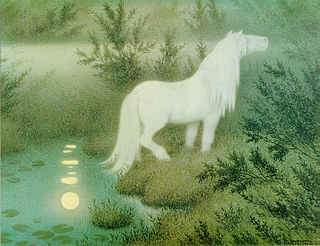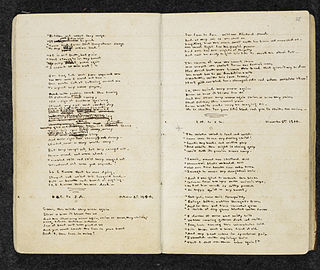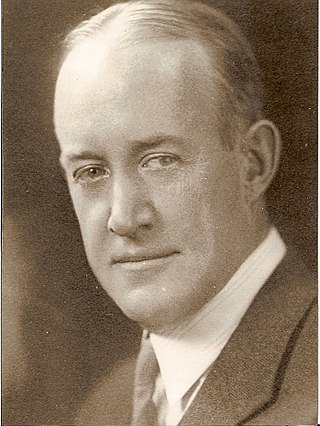
A fantasy world is a world created for fictional media, such as literature, film or games. Typical fantasy worlds involve magic or magical abilities, nonexistent technology and, sometimes, either a historical or futuristic theme. Some worlds may be a parallel world connected to Earth via magical portals or items ; an imaginary universe hidden within ours ; a fictional Earth set in the remote past or future ; an alternative version of our History ; or an entirely independent world set in another part of the universe.

A sequel is a work of literature, film, theatre, television, music or video game that continues the story of, or expands upon, some earlier work. In the common context of a narrative work of fiction, a sequel portrays events set in the same fictional universe as an earlier work, usually chronologically following the events of that work.

Ellen Anderson Gholson Glasgow was an American novelist who won the Pulitzer Prize for the Novel in 1942 for her novel In This Our Life. She published 20 novels, as well as short stories, to critical acclaim. A lifelong Virginian, Glasgow portrayed the changing world of the contemporary South in a realistic manner, differing from the idealistic escapism that characterized Southern literature after Reconstruction.

Gayatri Chakravorty Spivak is an Indian scholar, literary theorist, and feminist critic. She is a University Professor at Columbia University and a founding member of the establishment's Institute for Comparative Literature and Society.

A paracosm is a detailed imaginary world thought generally to originate in childhood. The creator of a paracosm has a complex and deeply felt relationship with this subjective universe, which may incorporate real-world or imaginary characters and conventions. Commonly having its own geography, history, and language, it is an experience that is often developed during childhood and continues over a long period of time, months or even years, as a sophisticated reality that can last into adulthood.

John Kirtland Wright (1891–1969) was an American geographer, notable for his cartography, geosophy, and study of the history of geographical thought. He was the son of classical scholar John Henry Wright and novelist Mary Tappan Wright, and the brother of legal scholar and utopian novelist Austin Tappan Wright. He married Katharine McGiffert Jan. 21, 1921 in New York, N.Y. They had three children: Austin McGiffert Wright, Gertrude Huntington McPherson, and Mary Wolcott Toynbee.
Douglas Woolf was an American author of short stories, novels and book reviews.

Fictional locations are places that exist only in fiction and not in reality, such as the Negaverse or Planet X. Writers may create and describe such places to serve as backdrop for their fictional works. Fictional locations are also created for use as settings in role-playing games such as Dungeons and Dragons.
Farrar & Rinehart (1929–1946) was a United States book publishing company founded in New York. Farrar & Rinehart enjoyed success with both non-fiction and novels, notably, the landmark Rivers of America Series and the first ten books in the Nero Wolfe corpus of Rex Stout. In 1943 the company was recognized with the first Carey-Thomas Award for creative publishing presented by Publishers Weekly.

John Henry Wright was an American classical scholar born at Urumiah (Rezaieh), Persia. He earned his Bachelors (1873) and Masters (1876) at Dartmouth College, New Hampshire. After junior appointments in 1886 he joined Johns Hopkins as a professor of classical philology. In 1887, he became a professor of Greek at Harvard, where, from 1895 to 1908, he was also Dean of the Graduate School of Arts and Sciences.

Mary Tappan Wright (1851–1916) was an American novelist and short story writer best known for her acute characterizations and depictions of academic life. She was the wife of classical scholar John Henry Wright and the mother of legal scholar and utopian novelist Austin Tappan Wright and geographer John Kirtland Wright.

Austin Tappan Wright was an American legal scholar and author, best remembered for his major work of Utopian fiction, Islandia. He was the son of classical scholar John Henry Wright and novelist Mary Tappan Wright, the brother of geographer John Kirtland Wright, and the grandfather of editor Tappan Wright King.
Mark Saxton was an American author and editor. He is chiefly remembered for helping edit for publication Austin Tappan Wright’s Utopian novel Islandia, and for his own three sequels to Wright's work.
Tappan Wright King is an American editor and author in the field of fantasy fiction, best known for editing The Twilight Zone Magazine and its companion publication Night Cry in the late 1980s. Much of his work has appeared under a shorter form of his name, Tappan King. He is the grandson of legal scholar and utopian novelist Austin Tappan Wright and the husband of author and editor Beth Meacham. He and his wife live near Tucson, Arizona.

Austin McGiffert Wright was an American novelist, literary critic and professor emeritus of English at the University of Cincinnati.
Alexander Plaisted Saxton was an American historian, novelist, and university professor. He was the author of the pioneering Indispensable Enemy (1975), one of the founding texts in Asian American studies.

Forced seduction is a theme found frequently in Western literature wherein man-on-woman rape eventually turns into a genuine love affair. A popular example is Luke and Laura from the American soap opera General Hospital.
Basil Davenport (1905-1966) was an American literary critic, academic, anthologist, and writer of science fiction novels and other genres. He was a member of the Baker Street Irregulars literary society. He was born in Louisville, Kentucky on March 7, 1905, the son of Ira William Davenport and Emily Andrews Davison. He died on April 7, 1966, in New York County, New York, at the age of 61.

Kirsten Saxton is a Professor of English at Mills College in Oakland, California where she is also the director of the MA of English.














